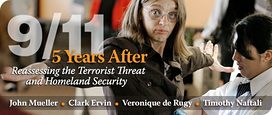While I am packing to come back to the US with my two toddlers after 10 days in France, I just found out that “passengers will be able to carry lotions and gels onto airliners again after a six-week ban, but only in tiny containers of 3 ounces or less and only if they’re in clear zip-top plastic bags.”
This is great news. It means that I won’t have to smuggle my doses of Benadryl to knock the girls out during the flight into Margot’s diaper. However, the fact that liquids were banned in the first place is a sign of what’s really wrong with our homeland security and the way we use our security dollars. For the last five years, most homeland security decisions have been a knee-jerk reaction to the news of the day. Of course this is also the path to inappropriate security spending since the surest way for a mode of transportation to get a boost in federal funding is to suffer a terrorist attack.
Think about it. On September 11th, nineteen terrorists hijacked four airplanes and crashed them into the World Trade Center Towers and the Pentagon. Within days of the event, Congress ordered a federal takeover of airport passenger screening and created a 45,000-employee bureaucracy. Protecting the country against September 11th-type hijackings became the priority, and the Transportation Security Administration (TSA) became a key player in the fight against terror. Billions later—and hours of harassing pilots, confiscating dangerous mustache scissors, and pawing grandmothers and children later—we’re finding out that we aren’t one step closer to getting protected again the next biggest risk: destruction of planes with explosives. And banning shampoo and bottled water is not going to change that.
Then there were the Madrid and London bombings. Until these attacks, few homeland security dollars were allocated directly to transit security (and, by the way, no federal security dollars should be going to transit security). But when coordinated bombings on the Madrid train system killed 191 people in March 2004, Congress immediately created a $150 million grant program for transit and rail security. And in the aftermath of the two attacks on the London subway system in July 2005, lawmakers asked for still more money for public transit systems. Senator Gregg (R-NH) offered an increase of $100 million. Senator Schumer (D-NY) talked of $200 million. Banking Chairman Richard Shelby (R-AL) called for a $1.2 billion increase, and Senator Clinton (D-NY) requested $1.3 billion. That, of course, is nothing compared to the $6 billion requested by William Millar, President of the American Public Transport Association.
Then, only a few weeks after the London bombing, the Gulf Coast was devastated by Hurricane Katrina. Because they have the attention spans of two-year-olds, members of Congress immediately turned all their attention to firefighters and natural disaster preparedness. Since then Congress has been committed to spend much more security money on natural disasters.
And I predict that things are going to get worse. Each time anything happens anywhere in the world, Congress will make sure that a new security grant is created or that more money is directed to an already existing grant.
Sadly no one ever asks the only relevant question which is “What will happen to the probability of being successfully attacked if we do nothing?” Until we do, we will keep on wasting our security dollars.

